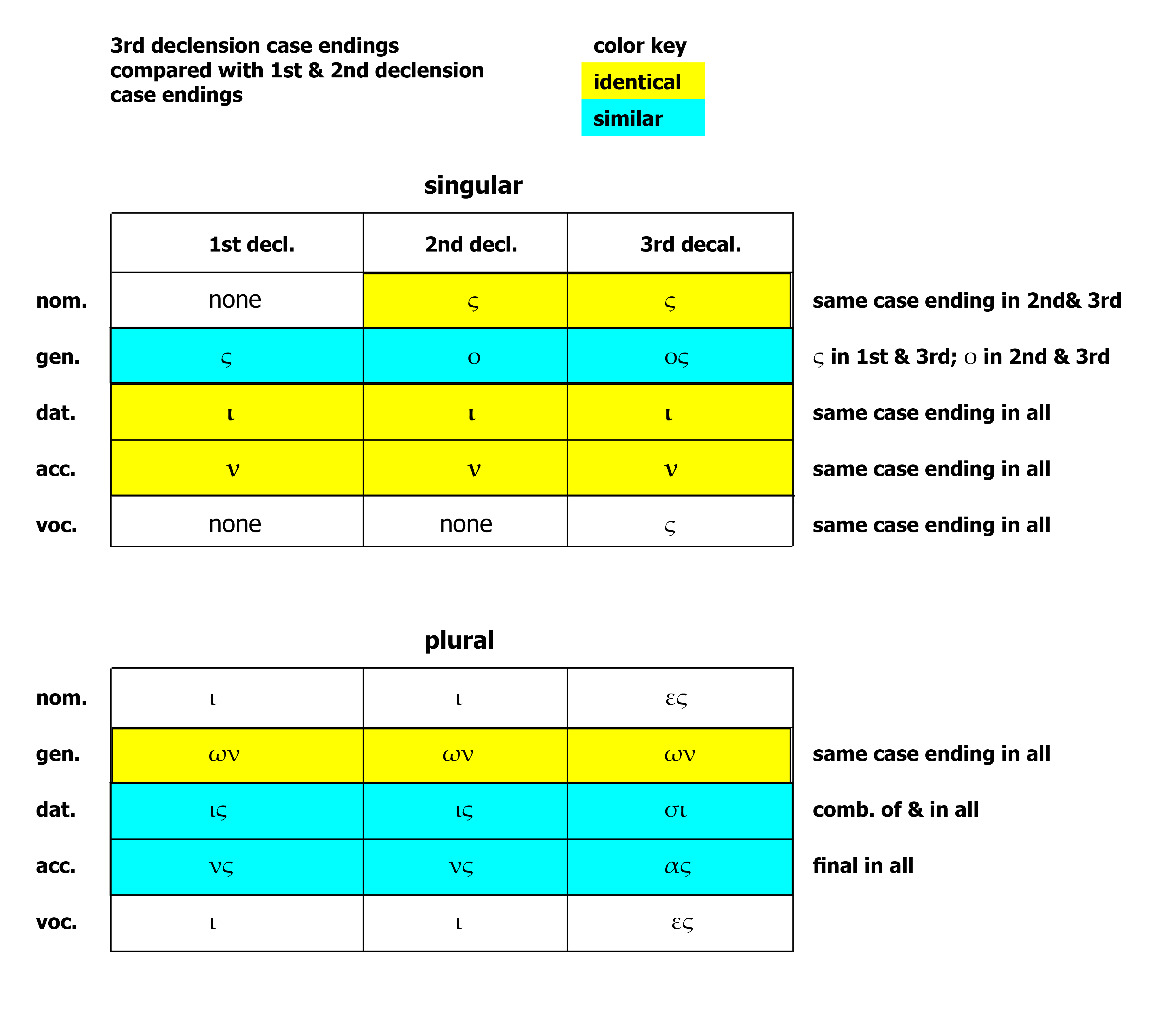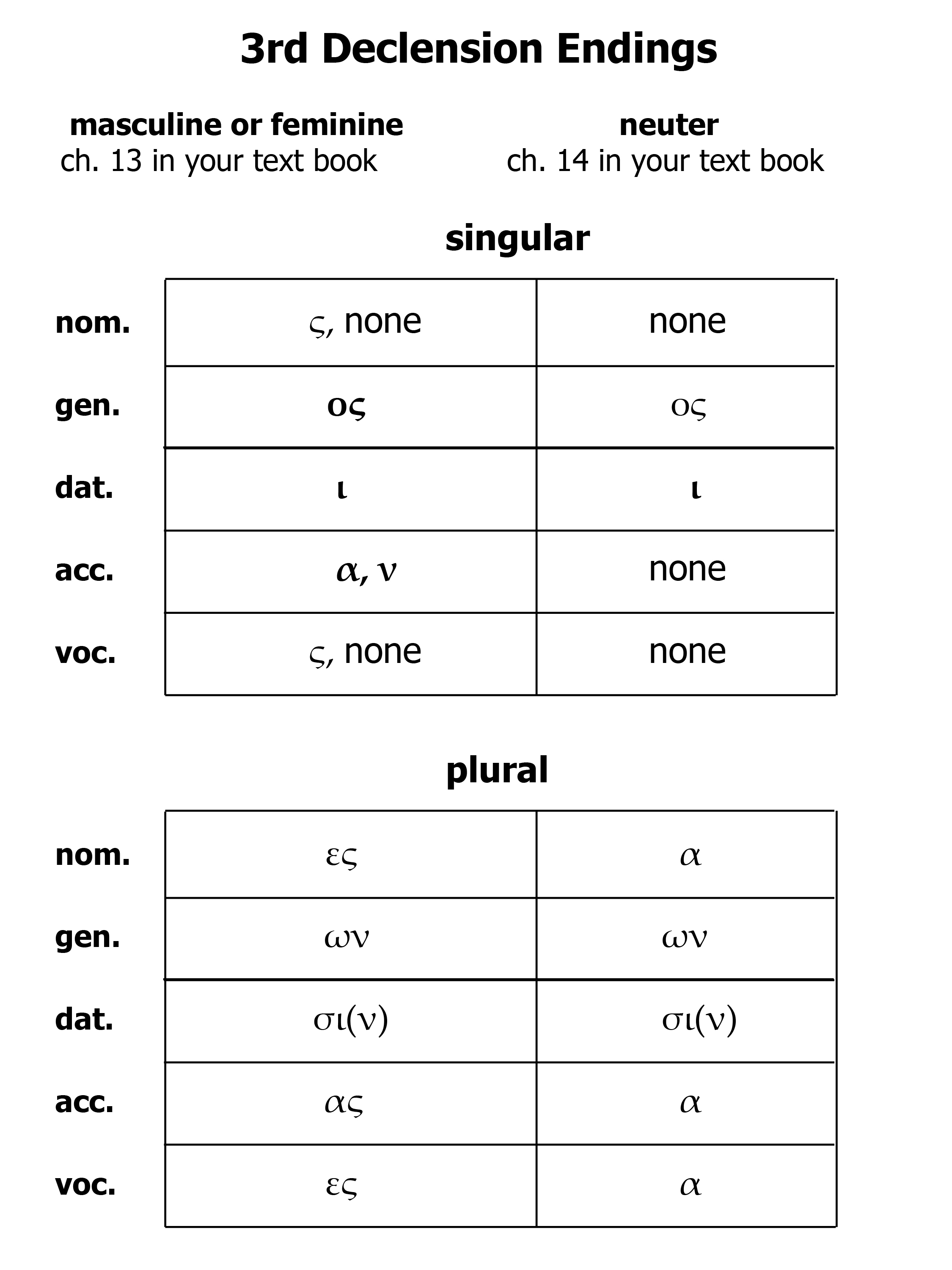Lesson 6 – 3rd Declension, χάρις, ἄρχων , 3rd Declension Endings Overview, Indefinite & Interrogative Pronouns
3rd Declension
We have already considered 2nd declension nouns and 1st declensions nouns. Now we will consider 3rd declension nouns.
The 3rd declension is more varied than the 1st and 2nd declensions. This is true in terms of form and also in terms of gender. In terms of gender, remember that 2nd declension nouns are usually masculine or neuter and 1st declension nouns are usually feminine. But in the 3rd declension, no particular gender is dominant. And in terms of form, at first glance it may seem that there is very little consistency to the case and number endings found in the 3rd declension. But closer examination will reveal two basic patterns (with variations) for 3rd declensions.
χάρις Type Nouns of the 3rd Declension
One variation often seen in 3rd declension nouns has some similarity to the 2nd and 1st declension endings you have already learned. Remember that in Course 1, Lesson 3, we identified the true masculine 2nd declension endings as ς, ο, ι, ν, etc. The “endings” ος, ου, ῳ, ον, are actually the final stem vowel of the 2nd declension (the omicron declension) in combination with the true endings. Similarly, the 1st declension endings α, ας, ᾳ, αν, etc. are actually the final stem vowel in combination with a similar set of true endings. Compare these true masculine 2nd declension endings and the true 1st declension endings with one pattern of endings frequently seen in 3rd declension nouns:

One noun that uses these particular 3rd declension endings is χάρις, -ιτος, ἡ, graciousness, attractiveness, grace, favor.
| plural | ||
| nom. | χάρις | χάριτες |
| gen. | χάριτος | χαρίτων |
| dat. | χάριτι | χάρισι(ν) |
| acc. | χάριν | χάριτας |
| voc. | χάρις | χάριτες |
The stem is actually χάριτ-, but the τ drops out in the nominative, accusative, and vocative singular, and in the dative plural. Note the moveable ν in the dative plural.
dental drops out before ς
ἄρχων
Another word that follows this same pattern with some variation is ἄρχων, -οντος, ὁ, ruler. This word is especially important because its endings are exactly those that we will see in the present active participles of the masculine gender. Memorize the declension of this noun.
| plural | ||
| nom. | ἄρχων | ἄρχοντες |
| gen. | ἄρχοντος | ἀρχόντων |
| dat. | ἄρχοντι | ἄρχουσι(ν) |
| acc. | ἄρχοντα | ἄρχοντας |
| voc. | ἄρχων | ἄρχοντες |
The stem is actually ἄρχοντ-, but in the nominative and vocative singular, the τ drops out and the ο lengthens to ω.
In the dative plural, dental τ drops out before σ, the ν also drops out,
and there is compensatory lengthening of the exposed stem vowel, ο, to ου. Also note the moveable ν in the dative plural.
Overview of 3rd Declension Endings
Chapters 13 and 14 in your text book show several 3rd declension nouns fully declined. Those in chapter 13 are either masculine or feminine and follow some variation of the pattern described above. Those in chapter 14 are neuter and follow another pattern. The table below shows the two basic patterns, including variations you can expect to see.

Various contractions, omissions, and vowel lengthenings occur as these endings are attached to nouns with various stem endings. There is a good discussion of these things in chapters 13 and 14 of your text book, along with illustrations of the various patterns with which you need to become familiar. Study these chapters carefully.
Indefinite and Interrogative Pronouns
These are discussed on pp. 111-112 of your text book. For your convenience, tables showing the declension of these pronouns are given here.
τίς interrogative pronoun who? which?
| singular | |||
| N | τίς | τίς | τί |
| G | τίνος | τίνος | τίνος |
| D | τίνι | τίνι | τίνι |
| A | τίνα | τίνα | τί |
| plural | |||
| N | τίνες | τίνες | τίνα |
| G | τίνων | τίνων | τίνων |
| D | τίσι(ν) | τίσι(ν) | τίσι(ν) |
| A | τίνας | τίνας | τίνα |
τις indefinite pronoun a certain one, someone
| singular | |||
| N | τις | τις | τι |
| G | τινος | τινος | τινος |
| D | τινι | τινι | τινι |
| A | τινα | τινα | τι |
| plural | |||
| N | τινες | τινες | τινα |
| G | τινων | τινων | τινων |
| D | τισι(ν) | τισι(ν) | τισι(ν) |
| A | τινας | τινας | τινα |
